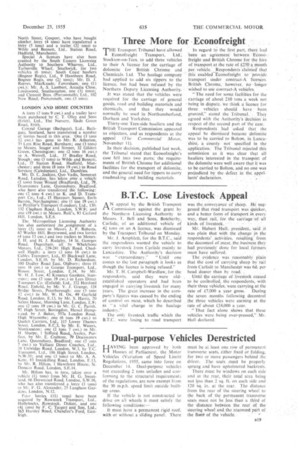B.T.C. Lose Livestock Appeal
Page 53

If you've noticed an error in this article please click here to report it so we can fix it.
AN appeal by the British Transport Commission against the grant by the Northern Licensing Authority to Messrs. T. Bell and Sons, Botcherby, 'Carlisle, of an additional vehicle of 42 tons on an A licence, was dismissed by the Transport Tribunal on Monday.
Mr. J. Amphlett, for the B.T.C., said the respondents wanted the vehicle to carry livestock from Carlisle mainly to Lancashire. The Authority's decision was " extraordinary." " Until one comes to the last paragraph it looks as though the licence is being 'refused."
Mr. T. H. Campbell-Ward law, for the respondents, said they were oldestablished operators and had been engaged in carrying livestock for many years. The great increase in the cornpant's figures was caused by the ending of control on meat, which he described as " a vital change in the haulage industry."
The only livestock traffic which the B.T.C. were losing to road • transport
was the, conveyance of sheep. He suggested that ?bad transport was quicker, and a better form of transport in every way, thari rail;for the •catriage.of all
kinds of livestock. . • Mi. Hubert Hull, president, said it was plain that with the chance in the respondents' activities, resulting from the decontrol of meat, the.business they ha,01.•previouslY done for local, farmers..
must have suffered. ,
The evidence was reasonably plain that the cost of carrying 'sheep by -rail from Carlislt to Manchester was' 6c1: per head ,dearer, than by road.
Until the carriage of livestock ceased to be con'trolled, the respondents, -with their three vehicles; were carrying at the
rate of £7,000 a year gross. During the Seven months following decontrol the three vehicles were earning at the rate of about £24,000 a year.
" That fact alone .shows that these vehicles were being over-pressed," 'Mr. Hull declared.




























































































